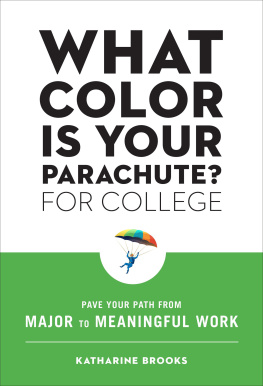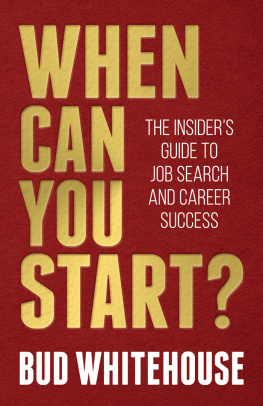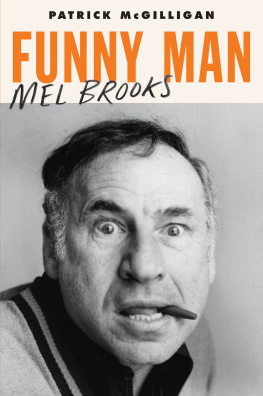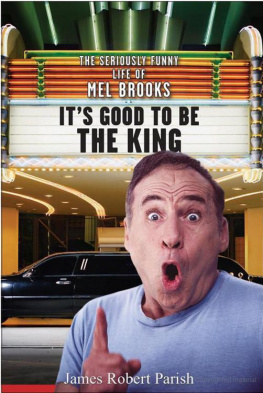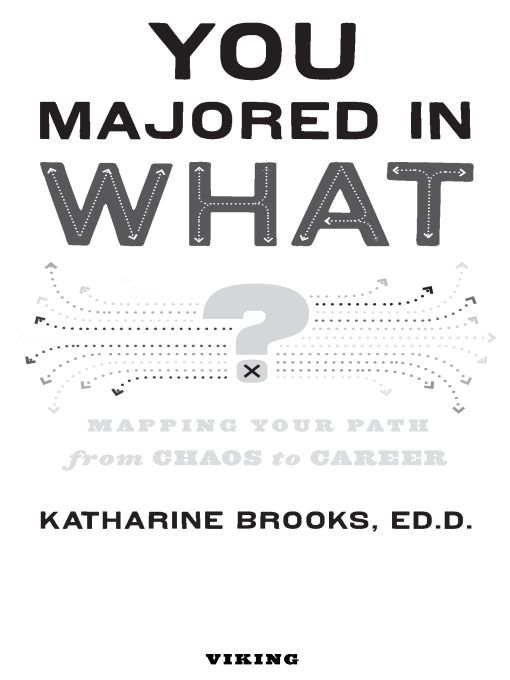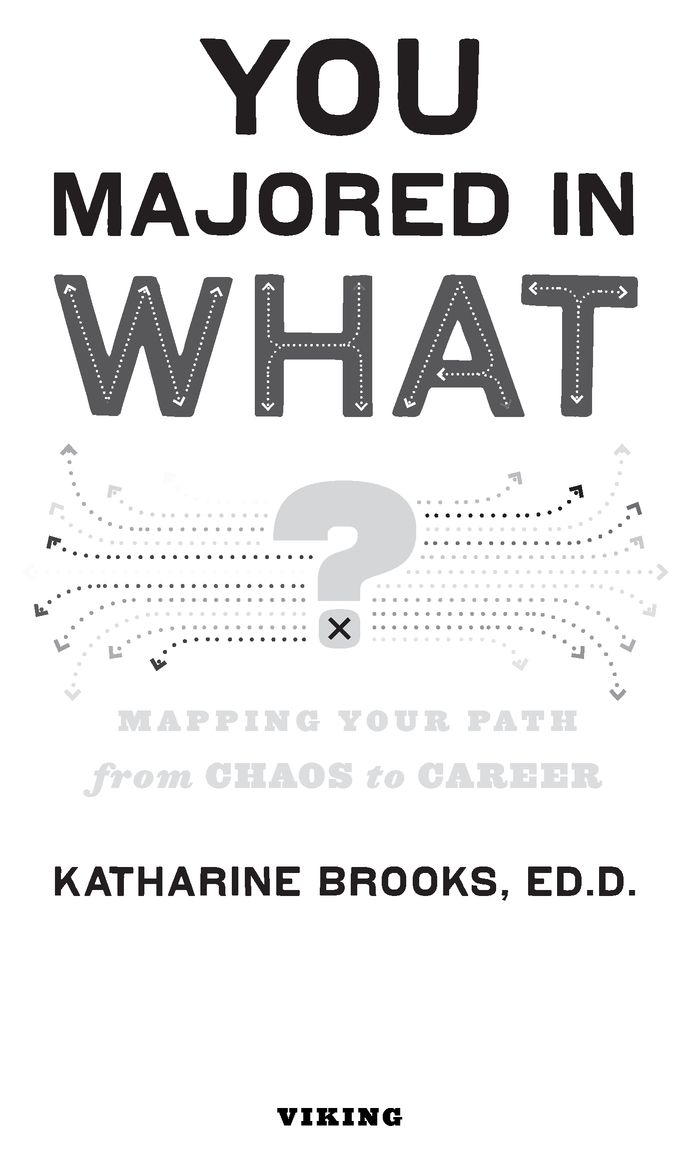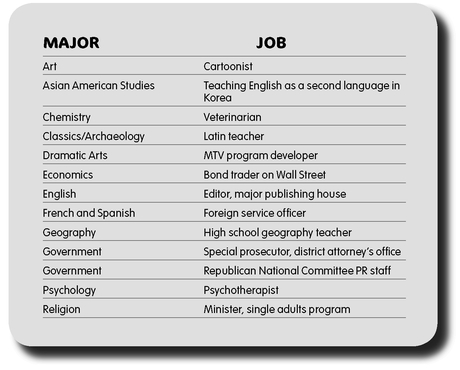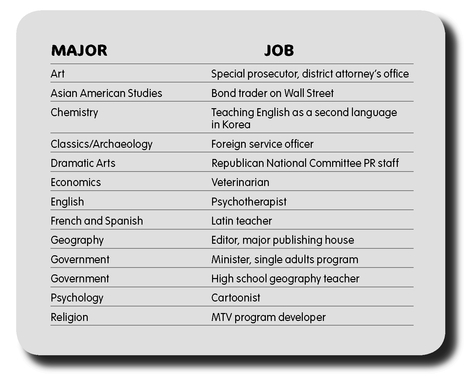Table of Contents
The wisdom contained in this book could not have become available at a better time for the millions of Gen Y college students and recent graduates who are simultaneously struggling with crushing levels of student debt and the desire to find a career where they can do meaningful work that is of benefit to society.
Steven Rothberg, President and Founder, CollegeRecruiter.com
An amazing, refreshing new perspective on an ancient question that does not leave sage advice behind! This book takes tried-and-true concepts and adds meaning and organization. One cant help but think, engage, and be encouraged by Kates valuable wisdom! Useful as a course text, a journal, a job search manual, or what it reads likea personal career companion, mentor, or friend. Born of chaos theory, this book is ready to deliver into the hands of the yearning who are eager to absorb it.
Loaded with images, constructive strategies, and meaningful advice, You Majored in What? is intellectual but practical, and readers will deepen their appreciation of their majors. With its many examples, exercises, reflections, and real-life stories, this book has something for every reader to grab hold of to achieve not only career success but also life and work success.
Denise Dwight Smith, Director, University
Career Center for Work, Service, and Internships,
University of North Carolina in Washington, NC
Through the use of positive language, metaphors, and practical application, You Majored in What? is a wonderful guide and workbook not only for the undergraduate student but also for the career center practitioner! Whether a student, mentor, or coach, unquestionably you will be inspired and empowered by the possibilities that will result from the Wise Wandering and mapping activities.
Meg Flournoy, Associate Director, The Duke MBA Career Management Center
You Majored in What? is filled with interactive exercises and is written in an engaging and practical way. This book will be a helpful resource for students as they consider their postcollege plans.
Deanne H. Maxwell, Assistant Director, Student and Career Development, Cornell University
You Majored in What? will speak to the person in career transition or the college student simply overwhelmed by the options. The tone is light and the exercises are manageable, designed to release your hidden dreams and strengths. This is a fresh and much needed addition to the field of career development.
Beverly T. Lorig, Director, Career Services, Washington &Lee University
To my parents and teachers,
on whose shoulders I stand:
infinite gratitude for shaping and guiding
my work and my life.
And
to singer, songwriter, and daydream believer
John Stewart (1939 -2008):
thanks for providing the soundtrack.
CHAPTER 1
A BUTTERFLY FLAPS ITS WINGS AND YOU FIND A JOB
CHAOS AND YOUR CAREER PLANS
You need chaos in your soul to give birth to a dancing star.
FRIEDRICH NIETZSCHE,THUS SPAKE ZARATHUSTRA
Has it happened yet? Have you been asked THE QUESTION?
You know the one: its the question that cuts to the core of your existence, the question that haunts you pretty much from the time you decide to be a college student to months, even years, after you graduate. It starts so innocently. Someone asks you what your major is, so you tell them.
Theres a slight pause. Then comes
THE QUESTION:
WHAT ARE YOU GOING TO DO WITH THAT?
OK, think fast.
Im going to law school, you say, even though you arent really sure you want to, but it sure sounds good. Or Im thinking about med school, even though you have no interest in science classes.
The questioners face relaxes; maybe he even smiles. He pats you on the shoulder. Wow, thats great!
And thats how the lie begins...
Do you feel sometimes theres a cosmic joke at work? That you chose this really interesting major but now youre wondering, was it worth it? Or perhaps youre just starting college and THE QUESTION is already making you nervous.
THE PRESSURE OF THE LINEAR PATH
The problem behind THE QUESTION is that it assumes a linear path between your major and your career. And the lure of the linear path is powerful. Its embedded in our thinking. From the time you played with fire trucks and people asked you if you wanted to be a firefighter, linear paths to careers have been assumed to be the natural state of things. So it seems only logical that you would pursue a major that would become your ultimate career. Business majors go into business. Engineering majors become engineers, philosophy majors become... ? Hmm...
Your parents would probably be thrilled if you had a glitch-free linear path from school to work all worked out. You know, Im studying accounting so I can be an accountant, or Im going to be an English major so I can teach English. You might be secretly relieved as well.
But thats early twentieth-century thinking1909 to be exact, when the trait-and-factor approach was designed to determine the best career choices for people. As America shifted from an agricultural to an industrial society, vocational researchers sought ways to determine the best fit between individuals and their jobs. Career tests were designed to match peoples interests and skills with potential vocations. Society placed additional restraints on employment, with women and minorities relegated to narrow fields. Most people pursued education to learn a specific trade, and a college education was reserved for the elite few who would likely go on to teaching, medicine, law, or the ministry.
In the twenty-first century, a college education is wide open to many more individuals regardless of gender, race, or career goal. Many students now choose a college education because of the interesting subjects they can study, not necessarily because of a specific career plan.
Whatever your reason for pursing your major, you, like many others, are probably struggling with THE QUESTION: What do I do with this degree? Where is my linear path?
To help you envision such a path, heres a list of the actual careers of some recent graduates, drawn from alumni surveys from three institutions. Note the relatively direct relationship between their majors and their careers.
Can you see the linear relationship that exists between a major and a career? The symmetry between the job duties and the use of the graduates skills? The English major is using her writing skills. The psychology major is helping people. The economics major is working on Wall Street. Its reassuring, isnt it? Not only can you get a job, your job can be directly related to your major.
Theres only one problem with the list:
its all wrong. These are the
actual careers of graduates with those majors:


